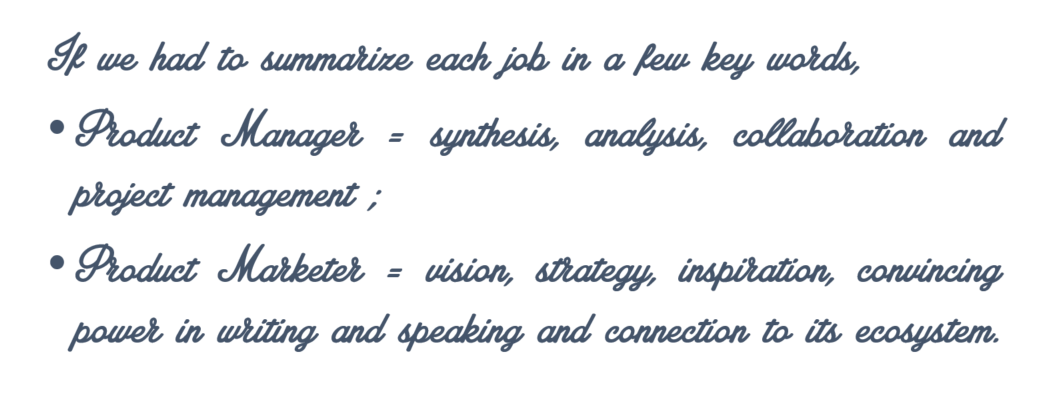
What is a Product Manager?
What is a Product Marketer?
How are they different?
When should you hire them?
with Amélie, Zeïna & Sébastien, from Serena Capital
The job of Product Manager is increasingly trendy in tech companies. At the same time, Product Marketing is a fairly recent activity in startups, something that’s seen a lot more traction over the last 4–5 years, as innovation becomes more and more disruptive and there’s a need to make those innovations easier to grasp & master by end users.
And yet, there are no schools to be trained in these professions, nor are there any typical profiles. There’s still a general blur.
We took a close look at this issue and tried to answer the following questions for tech companies:
What is a Product Manager? What is a Product Marketer? How are they different? When should you hire them?
You’ll find below the summary of our research & reflexions on the matter, as well as super cool 3min video in which we gathered great insights of PMs & PMMs of some of the best startups of the moment:
Charlotte @Heuritech, Johan @Malt, Pierre @TVTY and Timoté @Elium.
We sincerely hope that this will help you clarify the distinction between these 2 jobs and write your job desc.
#1 Product Manager, boss of the product
The Product Manager is very often perceived as the boss of the product. A Product Manager is a builder, constantly iterating, solving problems and empowering its collaborators to build the better experience for its users.
They’re in charge of new product development from vision to roadmapping, defining features and design.
Let’s have a close look at their main missions:
- Shape a vision:
put on paper the vision of the company’s CEO and, if there is one, in collaboration with the Product Marketing Manager. He formalizes the product vision that delivers value and differentiation and turns it into something understandable and actionable for all the rest of the team. - Gather and analyze data:
gather and analyze data and business intelligence from both internal sources like sales and/or marketing teams and external sources like customers, prospects, analysts, market studies, competitive analysis. The analysis of these data gives inputs that will create the rational to make decisions at strategy and roadmap level to enhance user satisfaction. In parallel, the PM defines and analyzes metrics that inform the success of products. - Build a roadmap:
define, design and deliver the roadmap which is a strategic (high level) document that articulates the main usage scenarios to address for each persona. The Product Manager will then cut these big blocks in smaller pieces to be prioritized. - Write specifications:
lead the ideation and transcribe roadmap elements into “stories” activable by the product, tech and design teams.
• Coordinate the development:
share the product vision, roadmap and key issues with the development team so that they understand what they need to develop. The Product Manager will then help them and manage eventually the acceptance phase at the end of the technical development.
• Communicate the product enhancements within the company:
interact very regularly with all the relevant stakeholders incl. developers, designers, sales and marketing teams to communicate the product enhancements and get feedbacks to ensure the product success.
#2 Product Marketer, boss of the go-to-market
Now let’s try to dig into why Product Marketers are so critical in tech companies.
The job of Product Marketing is still very fuzzy. In fact, it’s one of the few job functions that covers product, marketing and sales at the same time. It is more or less the link between the technical and the business worlds, with Tech and Product on one hand, and Sales and Marketing on the other hand.
Its end goal is to bring a product to market that generates revenue. Concretely, this means working hand in hand with the product to be a 2-way conduit for information between business and tech.
« A PMM needs to be able to understand 90% of what a product & technology are, and be able to percolate it into the 10% that will provide an exciting story to tell » Pierre Osdoit, Chief Marketing Officer @ TVTY
It means providing inputs to finetune a roadmap or a product specification, or defining the story, objection handling and creating the collaterals to be used by commercial teams to sell the product.
Just like for the Product Manager, we gathered a bunch of the main product marketers’ missions:
- Acquire a customer expertise:
understand customer needs and the current market environment to develop a strategy that will drive customer adherence. The PMM is the voice of the customer and should be knowing them better than anyone else in the team like what are their needs, how they buy, their preferences, their buying process… - Market intelligence:
in addition to customer knowledge, the PMM is in charge of an in-depth understanding of the market and detecting market trends. He’s the market & industry expert on top of trends and moves. - Competitive analysis:
build a rock-solid strategy to crush competitors in order to develop a strong competitive analysis and anticipate their strategic moves. It helps to pinpoint and capitalize on competitive advantages and to develop battle card for sales enablement. - Positioning and messaging:
identify the right value proposition to develop and implement high impact product positioning and messaging that differentiates in the market. What’s the product position? How do you put it into the right message? It will help evangelize within the company, industry and ecosystem.7 - External communication & relationships with analysts:
be responsible of most of external communication channels. Not only customers to understand their needs but also all the product communications with medias, analysts, etc. For more mature companies with an existing communications team, Product Marketing Manager should work closely with them to plan the communication. - Pricing & packaging:
define and develop the packaging for the different groups of users, the different levels of usage or support and the pricing strategy for major go-to-market channels. This is a very important issue because defining packages and prices is the heart of tomorrow’s business, the upsell of customers and therefore the business plan. - Build a sales toolkit designing product & market content:
being able to create a narrative is critical, as this will enable to train & equip commercial teams so as to industrialize the selling of new products. The PMM coordinates the creation of high impact materials including blog posts, demos, videos, white papers and business presentations. Their goal is to position the company as an opinion leader in its market and to transform sales reps and account managers into masters of value proposition and story telling. - Product & features launches:
drive and coordinate the launch of new products and releases providing guidance to the cross-functional teams in planning and prioritization. Make sure that at G&A date, all the organization (sales, customer success, tech and partners) is ready to deploy.
#3 The line between Product Management and Product Marketing is extremely thin
Although PM focuses more on product strategy whereas PMM is more focused on the market positioning and the value of the product, the boundary is rarely so well defined.
The border between the Product Manager and the Product Marketer will depend on a lot of factors including the size and the culture of the company or the type and the stage of the product.
- Maturity of the company: the younger the company, the weaker the boundary between the two is. There is often only one Product Manager who plays his role and that of the PMM.
- Complexity of the product: the more complex the product, the harder it is to manage Product Marketing and Product Management for one person. This does not require the same skills and kinds of individuals.

Both of them contribute to the product vision and must interact with key customers:
- The Product Manager to ensure that everything that is developed stays in line with reality and fulfils the needs of the customer
- The Product Marketer to understand the customers, make sure that the messages are clear and relevant.
Their job titles may also vary depending on the organization. Some companies do not have a Product Marketer which role is split between Product Manager and Business Analyst or the marketing team
#4 When should you hire a PM and a PMM?
The Product Manager should be hired first when a product vision is emerging and when the founders can’t focus on this anymore. The Product Manager will then participate actively in the building of the strategy and make sure an MVP is developed, tested and meets customers’ needs.
“Usually the first PM is hired at the first fundraising moment, when the company plans to grow fast” Johan Aradan, Product Manager @ Malt (ex-Hopwork)
The Product Manager’s role will then change significantly as the company grows. At the inception of the company, the PM would handle the MVP. Gradually the role will change into structuring a clear roadmap.
At the beginning the marketing team can take the lead on Product Marketing activities and then split the two at a later pace. As for the Product Marketing job, it can be handled by the marketing team when the company is at an early stage.
As soon as a prototype is ready to be launched, a PMM may be hired to take care of the industrialization of the sales effort and ensure the right messaging and the go-to-market action plan.
#5 Product Managers and Product Marketers share their stories with us
Now that we’re pretty clear about the difference between Product Management and Product Marketing, let’s give them the mic!
Super thanks to Charlotte @Heuritech, Johan @Malt, Pierre @TVTY and Timoté @Elium.
Are you a PM or a PMM and looking for a new position? Feel free to drop us a line at
zeina@serenacapital.com
Post and video on the Serena’s blog
Love,
Amélie, Zeïna & Sébastien
Find out more at www.serenacapital.com




